Related Research Articles
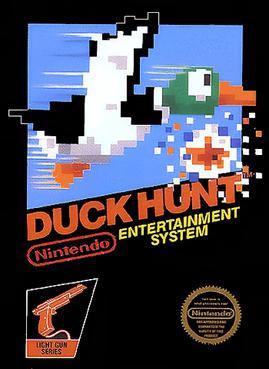
Duck Hunt is a 1984 light gun shooter video game developed and published by Nintendo for the Nintendo Entertainment System (NES). The game was first released in April 1984 in Japan for the Family Computer (Famicom) console and in North America as an arcade game for the Nintendo VS. System. It became a launch game for the NES in North America in October 1985, and was re-released in Europe two years later.
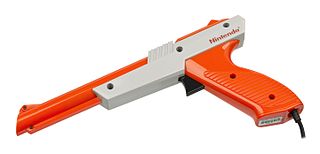
A light gun is a pointing device for computers and a control device for arcade and video games, typically shaped to resemble a pistol.
Shooter video games or shooters are a subgenre of action video games where the focus is on the defeat of the character's enemies using ranged weapons given to the player. Usually these weapons are firearms or some other long-range weapons, and can be used in combination with other tools such as grenades for indirect offense, armor for additional defense, or accessories such as telescopic sights to modify the behavior of the weapons. A common resource found in many shooter games is ammunition, armor or health, or upgrades which augment the player character's weapons.

Steam is a video game digital distribution service and storefront managed by Valve. It was launched as a software client in September 2003 to provide game updates automatically for Valve's games and expanded to distributing third-party titles in late 2005. Steam offers various features, like game server matchmaking with Valve Anti-Cheat measures, social networking, and game streaming services. Steam client's functions include game update automation, cloud storage for game progress, and community features such as direct messaging, in-game overlay functions and a virtual collectable marketplace.

Operation Wolf is a light gun shooter arcade game developed by Taito and released in 1987. It was ported to many home systems.

Terminator 2: Judgment Day or T2 is a light gun shooter based on the film of the same name, produced by Midway Manufacturing Company as an arcade video game in 1991. Developed in tandem with the movie, several actors from the film reprise their roles for the game and are featured as part of the game's photorealistic digitized graphics. The game's plot largely follows that of the film, casting up to two players as the T-800 "terminator" cyborg, sent back in time to protect John Connor from assassination by the T-1000 terminator. A success in arcades, home conversions of the game were released by Acclaim Entertainment for various platforms under the title of T2: The Arcade Game to avoid confusion with the numerous tie-in games also based on the movie.

The GunCon, known as the G-Con in Europe, is a family of gun peripherals designed by Namco for the PlayStation consoles. The original controllers used traditional light gun technology, while newer controllers use LED tracking technology.
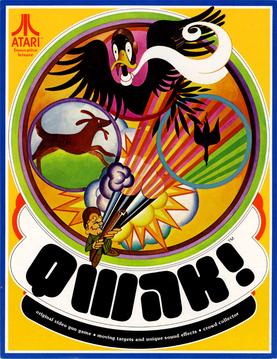
Qwak! is a single-player duck hunting light gun shooter arcade video game developed by Atari subsidiary Cyan Engineering and released in November 1974. In the game, ducks fly one at a time across the screen, and the player shoots at them using a light gun attached to the game cabinet. The player gets three shots per duck; ducks change direction away from missed shots and fall to the bottom of the screen when hit. A screen overlay adds images of reeds and a tree branch, and an image of a duck is added to a row at the top of the screen whenever a duck is hit. Games continue until a time limit, set by the machine operator, is reached.
Light-gun shooter, also called light-gun game or simply gun game, is a shooter video game genre in which the primary design element is to simulate a shooting gallery by having the player aiming and discharging a gun-shaped controller at a screen. Light-gun shooters revolve around the protagonist shooting virtual targets, either antagonists or inanimate objects, and generally feature action or horror themes and some may employ a humorous, parodic treatment of these conventions. These games typically feature "on-rails" movement, which gives the player control only over aiming; the protagonist's other movements are determined by the game. Games featuring this device are sometimes termed "rail shooters", though this term is also applied to games of other genres in which "on-rails" movement is a feature. Some, particularly later, games give the player greater control over movement and in still others the protagonist does not move at all. On home computer conversions of light-gun shooters, mouse has been often an optional or non-optional replacement for a light gun.
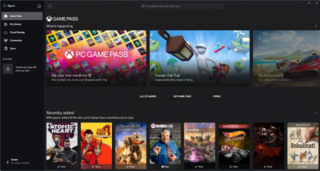
The Xbox app is an app for Windows 8, Windows 10, Windows 11, Android, iOS and Tizen. It acts as a companion app for Xbox video game consoles, providing access to Xbox network community features, remote control, as well as second screen functionality with selected games, applications, and content.

Steam Machine is a discontinued series of small form factor gaming computers by Valve, designed to operate SteamOS to provide a home game console-like experience. Several computer vendors were engaged with Valve to develop their own versions of Steam Machines for retail, offering additional options atop Valve's requirements such as dual-booting options with Microsoft Windows and the ability to upgrade the computer. Consumers could digitally purchase video games on their Steam Machine through Valve's namesake Steam storefront.

Reality Labs, formerly Oculus VR, is a business and research unit of Meta Platforms that produces virtual reality (VR) and augmented reality (AR) hardware and software, including virtual reality headsets such as Quest, and online platforms such as Horizon Worlds. In June 2022, several artificial intelligence (AI) initiatives that were previously a part of Meta AI were transitioned to Reality Labs. This also includes Meta's fundamental AI Research laboratory FAIR which is now part of the Reality Labs - Research (RLR) division.

Denuvo Anti-Tamper is an anti-tamper and digital rights management (DRM) system developed by the Austrian company Denuvo Software Solutions GmbH. The company was formed from a management buyout of DigitalWorks, the developer of SecuROM, and began developing the software in 2014. It was introduced with FIFA 15 in September. In addition to Denuvo Anti-Tamper, Denuvo Software Solutions has developed the anti-cheat system Denuvo Anti-Cheat and Nintendo Switch Emulator Protection, which attempts to prevent Nintendo Switch games from being emulated. The company was acquired by Irdeto in January 2018.

A virtual reality game or VR game is a video game played on virtual reality (VR) hardware. Most VR games are based on player immersion, typically through a head-mounted display unit or headset with stereoscopic displays and one or more controllers.

The Analogue Pocket is a handheld game console designed and manufactured by Analogue. Announced in October 2019 and released on December 13, 2021, it uses field-programmable gate array (FPGA) chips to play games from various handheld consoles up to the sixth generation.

Ghoul Panic is a 1999 light gun shooter arcade game developed by Raizing and published by Namco. A version for the PlayStation was released in 2000. Players used lightguns to complete a series of minigames, done by firing at on-screen targets. In these minigames there is an objective that must be fulfilled before the time runs out to progress such as shooting a certain amount of enemies or protecting small, yellow cats from projectiles. It ran on the Namco System 12 arcade hardware.

The Evercade is a handheld game console developed and manufactured by British company Blaze Entertainment. It focuses on retrogaming with ROM cartridges that each contain a number of emulated games. Evercade was released in May 2020 and upon its launch offered 10 game cartridges with a combined total of 122 games.
Arcade1Up is a computer hardware production company that specializes in the production of working 3/4 scale arcade cabinets that play arcade video games using modern components and emulation.
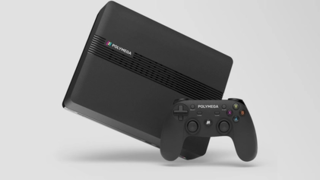
Polymega is a home video game console developed by American company Playmaji, Inc. It is a retro gaming console offering backwards compatibility with several CD-based and cartridge-based platforms: PlayStation, TurboGrafx-CD, Neo Geo CD, Sega CD, Sega Saturn, Nintendo Entertainment System (NES), Sega Genesis, Sega 32X, Super Nintendo Entertainment System (SNES), and Nintendo 64. It includes a built-in CD drive, while separate add-ons known as Element Modules provide support for cartridge-based games.
References
- ↑ Packwood, Lewis (7 March 2022). "'I just wanted to play Duck Hunt with my kids': the man on a mission to bring back the light gun". The Guardian . Guardian Media Group . Retrieved 27 December 2023.
- 1 2 McFerran, Damien (25 May 2023). "Review - Sinden Light Gun - Old-School Arcade Blasting On Your Modern-Day TV". Time Extension . Hookshot Media. Archived from the original on 2 June 2023. Retrieved 26 December 2023.
- ↑ "Driver Software". Sinden Lightgun®. Retrieved 26 December 2023.
- 1 2 Machkovech, Sam (30 January 2021). "A new $110 light gun for old Duck Hunts: Ars tests an HDTV-friendly option". Ars Technica . Condé Nast . Retrieved 26 December 2023.
- ↑ Vincent, Brittany (15 April 2019). "Sinden Lightgun hits Kickstarter funding goal in one day". Shacknews . Gamerhub. Retrieved 27 December 2023.
- ↑ Donaldson, Alex (11 March 2021). "Light gun games finally feel good on modern displays. It's time for Namco, Sega, and others to bring them back". VG247 . Gamer Network . Retrieved 26 December 2023.
- ↑ Hayton, Phil (12 December 2023). "Sinden Lightgun review: "My living room retro arcade dreams are now a reality"". GamesRadar+ . Future plc . Retrieved 26 December 2023.